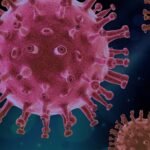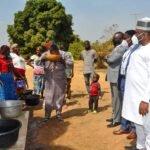Big things often start in small ways. Louis Pasteur may never have fully conceived the far-reaching effects of his innovative contribution to science and medicine. Thomas Edison may never have realized how the invention of a single lightbulb would impact civilization today. The team that visited Sauka, a rural community of about 3000 residents under Waru District in the Federal Capital Territory (FCT) to identify the health challenges of indigenous communities, never envisioned that the simple visit would end with the community accessing safe, quality drinking water.
How it started
Sauka community’s journey to accessing safe drinking water started with a simple visit in 2019. Dr Ifeanyi Nsofor, as part of his Atlantic Fellowship for Health Equity at George Washington University, U.S.A., and the Nigeria Health Watch team, accompanied by two journalists, visited the community to identify some of the health inequities faced by the Indigenous inhabitants of the community in Abuja.

This is significant because when the federal capital city was moved from Lagos to Abuja in 1991, many of the original inhabitants were relocated from their ancestral homes with promises of compensation. Some of these promises are yet to be fulfilled and they continue to lack access to basic life-saving social amenities, including healthcare, despite living close to Nigeria’s seat of power.




